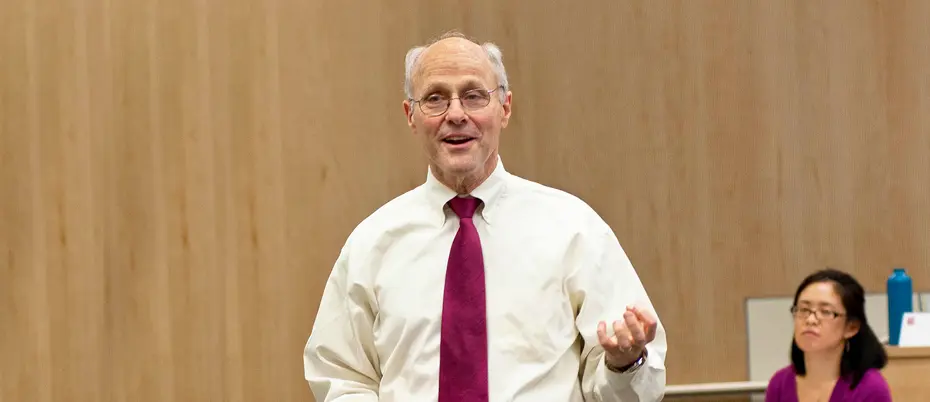Donald Rosenfield, a longtime leader of MIT Leadersfor Global Operations, dies at 70
Donald Rosenfield, the longtime director of MIT’s Leaders for Global Operations program and a senior lecturer at MIT Sloan, died Jan. 14 following an accident. He was 70.
A 1971 graduate of MIT, Rosenfield spent the first 15 years of his career as a consultant and teacher. He worked at MIT as a lecturer and a visiting associate professor for much of the 1980s. In 1987 he returned to the Institute for good to help lead a new degree program then known as MIT Leaders for Manufacturing.
“MIT’s bold plan for the future: school joins with business to help end US manufacturing decline,” read the headline in The Boston Globe on June 19, 1988, when the program was announced. With $46 million and 20 students, Leaders for Manufacturing placed students with corporate partners, including Polaroid, Boeing, and Johnson & Johnson, for six months of hands-on coursework. Then, as today, it was a two-year, dual-degree program. Students earned an MBA from MIT Sloan and a master’s degree from the MIT School of Engineering.
At the time, 28 percent of MIT Sloan students went to work in manufacturing after graduation, while 41 percent entered the finance field, according to the Globe article. Leaders at MIT worried the U.S. faced a dearth of managers with a technical education.
“It is perhaps the first time that such a genuine university and industry collaboration has been created, but also such a strong collaboration between schools at MIT: the school of engineering and Sloan,” said MIT Sloan professor Georgia Perakis, who was a faculty co-director of the dual-degree program from 2009 until 2015.
With Rosenfield’s guidance, the program grew and saw its graduates take leadership positions in some of the largest corporations in the United States. Perakis said more than 60 graduates have held upper management positions at Boeing, and she called that a conservative estimate. In 2009, the program was renamed “MIT Leaders for Global Operations” to reflect a broadened approach that looked beyond manufacturing to a company’s entire supply chain.
Institute professor Thomas Magnanti, who was a founding faculty co-director of Leaders for Manufacturing, said Rosenfield had a role in every aspect of the program’s development from its inception through his retirement, including strategy, finance, building relationships with partner companies, developing the curriculum, and working with students. Magnanti said Rosenfield was a “pioneer” of the program, along with himself and then-MIT engineering professor Kent Bowen.
“He was the key player in mentoring and advising the alumni and the students in the program in a wide variety of ways,” Magnanti said. “He became a dear friend to almost all the students who came through the program.”
Jeff Wilke, LGO ’93, Amazon’s chief executive of world-wide consumer, called Rosenfield “the plant manager of the LGO/LFM family,” and “uncommonly kind, intensely intelligent, wryly observant, and one of the best friends a person could hope for.”
“Don helped to teach me a very valuable playbook for optimizing operations,” Wilke said in an email. “We used the playbook relentlessly as we built Amazon’s processes. Many other alumni have told me of similar experiences. Don leaves an incredible legacy across hundreds of organizations.”
MIT engineering professor David Hardt, who was co-director of the LFM program from 1994 until 1998, worked with Rosenfield for nearly three decades.
“To those of us who have lived the full life of the program, Don was the keeper of the culture, the best friend to the students, and the one who made the whole system work” by balancing the goals of everyone involved, Hardt said.
Students, alumni, faculty, and staff of the LFM/LGO program formed a sort of extended family. Rosenfield was known to call each admitted student personally and was regularly present at program events, even after his retirement as program director in 2014. His retirement party, dubbed “DonFest,” drew hundreds of people for a reception at Fenway Park and a conference examining the history of the program and Rosenfield’s contributions to operations research and education. That year, the Leaders for Global Operations program received the UPS George D. Smith Prize for its work preparing students “to be good practitioners of operations research,” according to a forthcoming paper by Rosenfield and Perakis in the academic journal Interfaces.
Colleagues cited Rosenfield’s fantastic memory. He employed his ability to recall details to great effect when keeping tabs on nearly every student who went through the LGO program, more than 1,200 in all. His memory also served him well as an avid Boston sports fan. Magnanti said Rosenfield knew the score of every game in the historic Red Sox 1967 “Impossible Dream” season.
Rosenfield’s own family was part of the extended MIT family. While he was an MIT graduate himself, with three degrees, his wife Nancy also holds a bachelor’s degree in mathematics from MIT. All three of their children earned bachelor’s degrees from MIT — one for Jennifer, one for Todd, and two for Adam. Todd graduated from the LGO program in 2014, adding two master’s degrees. In all, the Rosenfield family holds ten MIT degrees.
“I think he took great pride in his family and all they’ve accomplished, and I think he also was greatly honored to be part of MIT,” said MIT Sloan professor Stephen Graves.
Rosenfield also conducted research, including a chapter in “Production in the Innovation Economy” based on his work with the MIT Task Force on Production and Innovation. He also supervised thesis work for many of the program’s students.
After stepping down as LGO program director, Rosenfield continued to teach for the operations management group at MIT Sloan. He taught Operations Strategy in the fall and Operations Lab in the spring. He was slated to teach Operations Lab again in the Spring 2018 semester. Last semester, he taught Operations Strategy with adjunct associate professor Zeynep Ton. He intended it to be his last time teaching the course. A surprise visit by Harvard Business School professor Roy Shapiro — a classmate of Rosenfield’s from MIT — made the last day of class an emotional event, Perakis said.
Rosenfield first came to MIT in 1965 and earned a bachelor’s degree in mathematics, an Electrical Engineer degree, and a master’s degree in operations research in 1971. (He deferred completion of his bachelor’s degree while working on the others). He earned his PhD in operations research at Stanford University in 1974. While a student at MIT, he worked at MIT’s Lincoln Laboratory where he “developed computerized prediction models for defense applications,” according to his CV.
Prior to joining MIT Sloan full time, Rosenfield also taught at Harvard Business School, the State University of New York College of Urban and Policy Sciences, and the Boston University School of Management (now the Questrom School of Business). In the 1970s and 1980s, he was a senior consultant at Arthur D. Little, Inc. in Cambridge, where he specialized in operations management, including manufacturing strategy, logistics strategy, and production and inventory planning.
Rosenfield was the co-author of at least five case studies, including examinations of Boeing Commercial Airplanes, Dell Inc., and the Tesla Roadster. He was the co-author of two books, “Operations Strategy: Competing in the 21st Century,” published in 2007, and “Modern Logistics Management: Integrating Marketing, Manufacturing and Physical Distribution,” published in 1985.
Throughout his career, Rosenfield was a friend, mentor, and leader whom colleagues remembered for his kindness and the personal attention he gave to each individual. Perakis said Rosenfield was the kindest person she ever met, and she recalled that the pair exchanged books at Christmas each year as gifts.
“Don was the most unselfish person you could find at MIT,” said Stephen Graves. “Honest, always positive, always willing to help, caring, with just a great attitude.”
Donald Barry Rosenfield was born July 24, 1947 in Boston. He is survived by his wife, Nancy; his mother, Miriam; his children Jennifer, Todd (Runa), and Adam; two grandchildren; a brother, Alan; and a sister, Cheryl. He lived in Lexington, Massachusetts.




